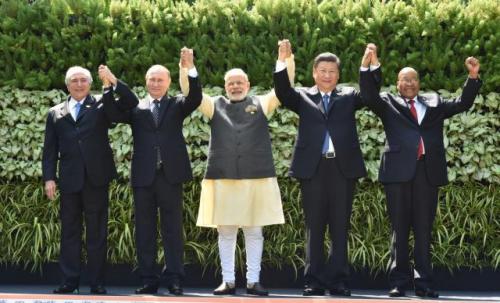
The members having contradictory economic and foreign policy interests can grow if they decide to learn from each other
The issue of terrorism stole the show at the recently-held BRICS summit in Goa whereas the approval of US $ 1 billion loans by the grouping’s New Development Bank for renewable energy projects did not get as much applause as it deserved. The operationalisation of BRICS Contingent Reserve Arrangements to strengthen the global financial safety net was another high point of the summit.
However, is it possible for Brazil, Russia, China and South Africa to grow together considering that they neither have the same strengths nor extremely similar development challenges? Can sheer economic size be the only determinant of profitability?
In this paper, Ruchir Sharma questions the validity of BRICS on the ground that they have little in common as far as economic and foreign policy interests are concerned. He points out that the BRICS countries generate growth in different and often competing ways. While Brazil and Russia are major energy producers that benefit from high energy prices, India, as a major energy consumer, suffers from them. Except in highly unusual circumstances, like in last decade, they are unlikely to grow in unison. Except China, they have limited trade ties with one another.
BRICS countries generate growth in different and often competing ways. While Brazil and Russia are major energy producers that benefit from high energy prices, India, as a major energy consumer, suffers from them
All the BRICS countries are slowing down which should not be surprising because it is hard to sustain hard growth for more than a decade. Russian economy is deeply out of balance dominated as it is by an oil-rich class of billionaires whose assets equal 20 per cent of the GDP.
China’s population, on the other hand, is simply too big and aging too quickly for its economy to continue growing as rapidly as it has. With 50 per cent of its population now in cities, it is nearing the point at which country’s surplus labour from rural areas is largely exhausted. This is the result of both heavy migration to cities and shrinking work force due to one-child policy.
As growth slows in China and in advanced industrial world, these countries will buy less from their export-driven counterparts which include Russia and Brazil. These countries have to find new ways to achieve growth. The uneven rise of emerging markets will impact global politics in a number of ways. It will revive the self-confidence of the West and dim the economic and diplomatic glow of recent starts such as Brazil and Russia.
Another casualty will be the notion that China’s success demonstrates the superiority of authoritarian, state-run capitalism. Of the 124 emerging-market countries that have managed to sustain a five percent growth rate for a full decade since 1980, 52 per cent were democracies and 48 per cent were authoritarian. So what matters is the presence of leaders who can understand and implement the reforms for growth rather than the kind of political system the country has.
India with its huge young population may seem a likely candidate but the resulting workers also need to have the required skills to compete in the global market and right government policies to get them jobs
The fact that China’s boom was driven in part by a large generation of young people entering the work force, analysts have been looking for similar population bulges as an indicator of the next economic miracle. India with its huge young population may seem a likely candidate but the author cautions that the resulting workers also need to have the required skills to compete in the global market and right government policies to get them jobs.
This is the reason may be why India needs to stem its job-less growth especially when it wants to take advantage of its demographic profile. The recent report that India has lost 550 jobs per day in last four years does not bode well with this ambition.
Another paper says the variance in diplomatic character of the member countries would not alter the conditions of international interactions with other players. While India, Brazil and South Africa have successfully demonstrated use of soft power in diplomacy, Russia and China still lag on that front. The only hope is that the members learn from each other and arrive at a balance
Liked this story? GoI Monitor is a non-profit, and we depend on readers like you to Support Our Efforts
